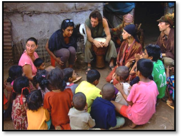Master of Arts in Transformational Urban Leadership (MATUL) Program
TUL555 Educational Center Development (3 units)
Spring 2013
Welcome!
TUL555 Educational Center Development is one of the five “internship” courses in the MATUL program. That is, it integrates a 40-hour service-learning project into the academic structure of the course.
The course will go “live” on [date] and stay open until [date]. That’s 15 weeks. During that time period, you will be able to log in to the course through the APU website (with ID and password).
To get started in the course, go to the APU home page. Look for “Online” in the red-shaded column on the right side of the page. Click on it. Go to the “Online Course Login” and click on it. This will bring you to the Login page. Enter your student ID # (include the dashes) and your password (usually your first name with first letter capitalized); then click “Login.” This will bring you to a Welcome page. Find TUL670 and click on it. This opens the course home page. Look for Course Syllabus in the upper left hand corner. Click on the syllabus and read it very carefully. If there are any questions, please post them to me and I will clarify for everyone.
1. Course Structure
The course is spread over a single semester. There are seven (7) “forums” (online discussions), along with three (3) projects (inclusive of the internship). Refer to the course syllabus for discussion and project descriptions, along with point values.
2. Online Discussion
Running across each of the projects is an “Online Discussion” process. For each of the course topics, for example, we will have a discussion, either via Forum (in Sakai) or through a group Skype call.
Participation in these discussions is integral to the course process and is factored into the final grade (see syllabus). I will typically pose a “prompt” consisting of one or more questions that each student is expected to respond to. The response needs to be substantive—that is, it needs to (1) draw upon ideas from any assigned readings, joined with personal experience, and (2) respond intelligently to other students’ posts.
Each discussion will relate to a particular project and have strict time parameters. This means that you will have to organize the course workload to complete project-related reading and/or fieldwork within the online discussion time frame. After the specified end-date, the threads will be read-only.That means you willbe able to go back and read the discussions, but you won’t be able to add more posts; they will be “locked.”
This points to one of the greatest challenges in community-based learning: constructing a personal schedule for completing the various self-directed projects. By this time in the program you will have gotten good practice at this, but the process will continue to “test” your self-motivation, time organization, and conscientiousness.
I regret that I am not able to be where you are, dwelling in a foreign community, confronted with the “new” at every turn, and completing each of these projects with you. My consolation is that I will learn much from your experience in the local schools where you will serve and research.
3. Weekly Announcement
Every Monday I will try to send a greeting with reminders and any new information you might need. These will be posted in “Announcements” in Sakai.
4. Class Lounge
The “Class Lounge” function in Sakai allows students to post questions that are of relevance to everyone in the class. Rather than each student emailing me, and me responding to them, student questions and instructor responses are made available to everyone. Of course, individual student issues can be managed through email correspondence.
5. Order Texts Now!!
Listed below and in the course syllabus is the required text. Please order it TODAY.


